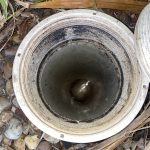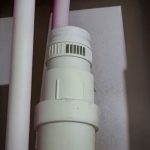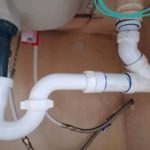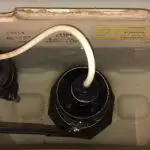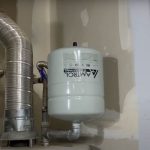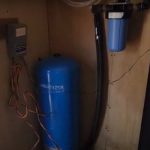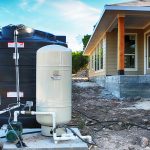If you are experiencing Richmond water heater gas valve problems, the pilot light may not stay lit, indicating a potential issue with the gas valve. This can lead to a lack of heat, inconsistent heat output, or excessively hot water.

Richmond Water Heater Gas Valve Problems List
If you’re experiencing issues with your Richmond water heater’s gas valve, you may notice that the pilot light won’t stay lit. This is just one of the potential problems that can arise. Seek professional assistance to diagnose and repair the gas valve problem for optimal performance.
Here are some common gas valve problems you may encounter with your Richmond water heater:
- Pilot light won’t stay lit: This could be due to a faulty gas control valve that is not allowing enough gas flow to keep the pilot light ignited.
- No hot water: If you’re not getting any hot water, the gas valve may be malfunctioning and not allowing gas to reach the burner to heat the water.
- Inconsistent temperature: If you notice that the temperature of your hot water fluctuates, it may be a result of a malfunctioning gas valve that is not properly regulating the gas flow to the burner.
- Gas leak: A faulty gas valve can sometimes cause gas leaks, which are not only dangerous but also pose a risk of explosion. If you smell gas near your water heater, it’s important to shut off the gas supply and contact a professional immediately.
- Pilot light won’t ignite: If the gas valve is not functioning properly, it may not open to allow gas flow to the pilot light, preventing it from igniting.
- Problems with the gas control dial: Sometimes, the gas control dial on the gas valve may become stuck or unresponsive, making it difficult to adjust the temperature of the water.
- Water heater not turning on: A malfunctioning gas valve can prevent the water heater from turning on altogether. This can be a frustrating issue as it affects your access to hot water.
Remember, if you encounter any of these problems with your Richmond water heater gas valve, it’s always best to consult a professional plumber or technician to properly diagnose and resolve the issue. Additionally, regular maintenance and inspections can help prevent these problems from occurring in the first place.
Understanding Richmond Water Heaters
Richmond water heater gas valve problems can lead to a pilot light that doesn’t stay lit, signaling potential issues with the valve itself or other important components. HeaterFixLab provides solutions to help address these problems and keep your water heater functioning properly.
Richmond water heaters are a popular choice for many homeowners due to their reliability and efficiency. However, like any appliance, they can experience issues over time, particularly with the gas valve. Understanding how Richmond water heaters work and the potential problems that can arise will help you troubleshoot and address any issues that may occur.
Below are some key points to help you understand Richmond water heaters:
- Richmond Water Heaters: These water heaters are manufactured by Rheem, a well-known and trusted brand in the industry. They are designed to provide hot water efficiently and reliably.
- Gas Valve Function: The gas valve in a Richmond water heater controls the flow of gas to the burner, allowing the water heater to heat the water. It is a crucial component that ensures the proper functioning of the water heater.
- Common Gas Valve Problems: Just like any other part of the water heater, the gas valve can experience problems. Here are some common issues you may encounter:
- Pilot Light Issues: If the pilot light on your Richmond water heater goes out frequently or fails to ignite, it could be due to a faulty gas valve.
- Temperature Control Problems: A malfunctioning gas valve can cause the water temperature in your Richmond water heater to fluctuate or remain constant at a high temperature.
- Gas Leakage: If you notice a gas smell around your water heater or suspect a gas leak, the gas valve could be the culprit.
- Troubleshooting Tips: If you are facing gas valve problems with your Richmond water heater, here are some troubleshooting tips to consider:
- Check the Pilot Light: Make sure the pilot light is lit and remains lit. If it keeps going out, there may be an issue with the gas valve or thermocouple.
- Inspect for Gas Leaks: Use a gas leak detector or a solution of soapy water to check for any gas leaks around the gas valve and connections.
- Consult a Professional: If you’re uncertain about how to troubleshoot or repair your Richmond water heater’s gas valve, it’s best to consult a professional plumber or HVAC technician.
Understanding how your Richmond water heater works and being aware of potential gas valve problems will help you maintain its performance and ensure hot water availability in your home. Regular maintenance and timely repairs will keep your water heater operating efficiently and prolong its lifespan.
Identifying Gas Valve Problems
Are you facing gas valve problems with your Richmond water heater? One common issue is the pilot light not staying lit. Discover the signs and solutions to Richmond water heater gas valve problems at HeaterFixLab.
Gas valve problems in a Richmond water heater can cause various issues, including a pilot light that won’t stay lit or a lack of hot water. Below are the common signs and symptoms of gas valve problems to help you identify and address the issue efficiently:
- Pilot Light Issues:
- Pilot light won’t stay lit after releasing the button.
- Pilot light goes out randomly.
- Pilot light is yellow instead of blue, indicating an improper combustion.
- Hot Water Problems:
- Inadequate hot water temperature.
- No hot water at all.
- Hot water temperature fluctuates rapidly.
- Noise or Smell:
- Unusual noises coming from the gas valve, such as hissing or banging sounds.
- Gas leak smell near the water heater.
- Ignition Problems:
- Ignition takes longer than normal or fails altogether.
- Frequent need to relight the pilot.
If you experience any of these signs or symptoms, there’s a high chance that your Richmond water heater’s gas valve has a problem. It’s crucial to address gas valve issues promptly to ensure the safe and efficient operation of your water heater.
Causes Of Gas Valve Problems
Richmond water heater gas valve problems can manifest in various ways, such as the pilot light not staying lit or changes in heat output. These issues may be due to a worn-out or damaged valve, electronic ignition components, or safety circuit glitches.
If you’re experiencing gas valve problems with your Richmond water heater, it’s important to address them promptly to ensure efficient and safe heating.
Gas valve problems can occur in Richmond water heaters due to various factors. These issues can disrupt the proper functioning of the gas valve, leading to heating problems. Here are some common causes of gas valve problems to be aware of:
- Corrosion and wear: Over time, the gas valve can corrode or experience wear and tear, leading to malfunctioning. This can be caused by exposure to moisture, chemicals, or other external elements.
- Sediment buildup: Sediment, such as minerals and debris, can accumulate in the gas valve over time. This buildup can obstruct the flow of gas, resulting in improper heating and potential valve damage.
- Faulty thermocouple: The thermocouple is a safety device that senses the presence of a pilot flame. If the thermocouple malfunctions or becomes faulty, it may not send the proper signals to the gas valve, causing it to shut off unexpectedly.
- Electrical issues: Gas valves in Richmond water heaters may also experience electrical problems. This could include issues with wiring connections or faulty electrical components, which can disrupt the valve’s operation.
- Pressure problems: Gas valve problems can also be caused by issues with gas pressure. If the gas pressure is too low or too high, it can affect the functioning of the valve, leading to heating issues or valve failure.
- Age and deterioration: Like any mechanical component, gas valves can deteriorate over time. This is especially true for older water heaters. As the valve ages, it becomes more susceptible to problems and may require repairs or replacement.
It is important to address gas valve problems promptly to ensure the proper and safe operation of your water heater. Consulting a professional plumber or technician can help diagnose the exact cause of the issue and provide appropriate solutions.
Step-By-Step Guide For Troubleshooting Common Issues
Get step-by-step troubleshooting guidance for common issues with Richmond gas water heaters. Learn how to diagnose and replace faulty gas valves, as well as fix problems with the pilot light and heat output. Find helpful resources and solutions to maintain your water heater’s performance.
Troubleshooting Common Problems With Richmond Water Heater Gas Valve
If you’re experiencing issues with your Richmond water heater gas valve, don’t fret! Troubleshooting common problems can be a simple process. Follow this step-by-step guide to diagnose and fix the issue:
Pilot Light Won’T Stay Lit
- Check for a gas supply: Ensure that the gas supply to the water heater is turned on. Look for any obstructions or damages in the gas line.
- Clean the pilot orifice: Use a wire brush or compressed air to clean any dirt or debris that may be blocking the pilot orifice.
- Adjust the thermocouple: Make sure the thermocouple is properly positioned and tightened. If it is misaligned or loose, it may not sense the pilot flame, causing it to go out.
- Replace the thermocouple: If the thermocouple is damaged or faulty, replacing it may solve the issue.
Water Heater Not Heating
- Check the gas valve: Ensure that the gas valve is in the “on” position. If it’s off, turn it on and wait for a few minutes to see if the water starts heating.
- Inspect the burner assembly: Look for any signs of dirt or debris on the burner assembly. Clean it if necessary.
- Test the thermostat: Use a multimeter to test the thermostat for continuity. If it’s not functioning properly, consider replacing it.
- Check the gas supply: Make sure there is enough gas in the tank and that the gas supply is turned on.
Gas Valve Leaking
- Check for gas leaks: Use soapy water or a gas leak detector to check for any leaks around the gas valve and connections. If you detect a leak, turn off the gas supply immediately and call a professional for repairs.
- Tighten connections: Ensure that all connections to the gas valve are tight and secure.
- Replace damaged parts: If the gas valve is visibly damaged or corroded, it may need to be replaced.
Remember, if you’re unsure about troubleshooting your Richmond water heater gas valve, it’s always best to seek professional help. Safety should be the top priority when dealing with gas appliances.
Conclusion
Richmond water heater gas valve problems can be identified when the pilot light does not stay lit. This issue can lead to various complications in the functioning of the water heater. Seek professional assistance to repair or replace the gas valve to ensure optimal performance.
Common Richmond Water Heater Gas Valve Problems
- Water heater gas valve and thermocouple replacement can be a common issue faced by Richmond water heater users.
- The gas valve is responsible for controlling the flow of gas to the burner, while the thermocouple is a safety device that detects if the pilot light is lit.
- If you notice any problems with the gas valve or thermocouple, it is important to address them promptly to ensure proper functioning of your water heater.
- Some common issues include a faulty gas control valve, a pilot light that won’t stay lit, or temperature inconsistencies.
Signs Of A Bad Heater Control Valve
- No heat coming out or heat always on and cannot be turned down.
- Heat output changes with no changes in the heat setting.
- Temperature gauge reads hot or low coolant level.
- Coolant leak.
How To Check If Your Water Heater Control Valve Is Bad
- Check for any of the signs mentioned above indicating a bad control valve.
- Monitor the heat output and temperature gauge to see if they are behaving erratically.
- Look for any leaks or issues with the coolant level.
Gas Valve And Thermocouple Replacement Process
- Gas Valve Replacement:
- Turn off the gas supply to the water heater.
- Disconnect the gas line from the old gas valve.
- Remove the old gas valve from the water heater.
- Install the new gas valve in place of the old one.
- Reconnect the gas line and turn on the gas supply.
- Thermocouple Replacement:
- Turn off the gas supply to the water heater.
- Locate the thermocouple near the pilot light assembly.
- Disconnect the thermocouple from the gas valve.
- Install the new thermocouple in place of the old one.
- Reconnect the thermocouple to the gas valve.
How To Reset A Gas Water Heater Valve
- Turn off the gas supply to the water heater.
- Locate the reset button on the gas valve.
- Press the reset button and hold it for a few seconds.
- Release the reset button.
- Turn on the gas supply back to the water heater.
Richmond water heater gas valve problems can be frustrating, but they are not uncommon. Knowing the signs of a bad control valve and understanding the replacement process for the gas valve and thermocouple can help you address these issues effectively.
If you are unsure about handling the repairs yourself, it is always recommended to consult a professional plumber for assistance. By staying vigilant and taking prompt action, you can ensure the efficient and safe operation of your Richmond water heater.
Frequently Asked Questions On Richmond Water Heater Gas Valve Problems
How Do I Know If My Water Heater Control Valve Is Bad?
Signs of a bad water heater control valve include no heat coming out, heat always on and cannot be turned down, heat output changing with no changes in the setting, temperature gauge reading hot, low coolant level, and coolant leak.
A faulty gas control valve may cause the pilot light to go out or not stay lit, make the water too hot, or trip the heat limiter.
How Do You Reset A Gas Water Heater Valve?
To reset a gas water heater valve, follow these steps:
1. Turn off the gas supply to the heater.
2. Locate the control panel, usually near the bottom of the heater.
3. Press and hold the reset button for about 10 seconds.
4. Release the button and turn the gas supply back on.
5. Wait for the heater to ignite and start producing hot water again.
Do Water Heater Gas Valves Go Bad?
Gas valves on water heaters can go bad. If your pilot light keeps going out or the water gets too hot, it may be due to a faulty gas control valve. Other parts like the thermocouple and thermostat could also be the issue.
What Does It Mean When Your Water Heater Says Gas Control Or Valve Failure?
Gas control or valve failure in a water heater means that the valve responsible for controlling the gas flow to the heater is not functioning properly. This can be caused by wear and tear, damage from water exposure, or issues with electronic components.
Signs of a bad valve include a pilot light that won’t stay lit, inconsistent heat output, or a malfunctioning safety circuit. If you experience these issues, it’s important to address the faulty gas valve to ensure proper function of your water heater.
Conclusion
To summarize, Richmond water heater gas valve problems can be a significant issue for homeowners. If your pilot light won’t stay lit or you’re experiencing inconsistent heat output, it’s likely due to a faulty gas control valve. This valve may wear out over time or become damaged, causing your water heater to malfunction.
- How Does a Plumber Find a Water Leak Underground: Leak-Solving Secrets
- Double Kitchen Sink Plumbing Diagram: Ultimate Guide
- American Plumber 600R: Optimize Your Water Purity!
- Air Admittance Valve for Toilet: Essential Guide
- Why is ABS Pipe No Longer Used? – Fix Advise
- When to Remove Plastic Insert in Sharkbite Fittings?
- Are Air Admittance Valves Legal in Illinois? (Know the Facts)
- Can You Swap Your Kohler Valve for a Flapper? Find Out!
- Bathtub Drain Slow But Not Clogged: Quick Fixes
- Water Leaking from Bottom of Toilet During Shower: Causes and Fixes
- Are Offset Toilet Flanges against Code?
- What Side is Hot And Cold Water?- (Water Temperature)
- Water Heater Expansion Tank Leaking: Expert Tips for Effective Fixes
- What Size Hole Saw for 2 Inch Pvc? – Fix Advise
- Water Meter Spinning No Water Running: Troubleshooting and Solutions
- Can You ProPress Soft Copper: Tips & Techniques
- Water Right Water Softener Reviews in 2024
- Push in Connectors Vs Wire Nuts – Wiring Made Simple!
- Toilet Won’t Flush When Shower is Running: Troubleshooting Tips
- Can You Use Bleach With a Septic Tank : Dos and Don’ts


